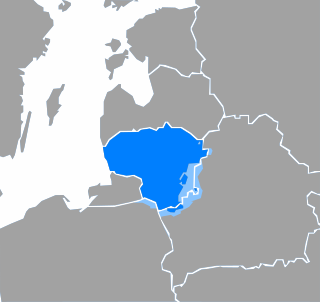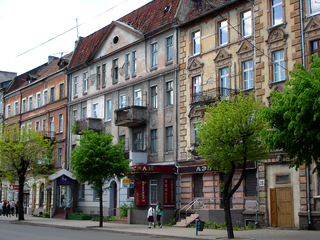The Lithuanian Conservative Election Societies (Lithuanian : Lietuviškos konservatyvų skyrimo draugystės) were several loosely connected political societies of Prussian Lithuanians active from 1890 to the German Revolution of 1918–19. They sought to elect Prussian Lithuanians to the German Reichstag and Prussian Landtag and to defend the use of the Lithuanian language. The societies managed to get two representatives to the Reichstag (Jonas Smalakys in 1898–1901 and, after Smalakys' death, Friedrich Martin Mattschull in 1901–1903) and two to the Landtag (Wilhelm Gaigalat in 1903–1918 and Wilhelm Steputat in 1913–1918). [1] It is sometimes described as the first Lithuanian political party (the Social Democratic Party of Lithuania was established in 1895). [2]

Lithuanian is a Baltic language spoken in the Baltic region. It is the language of Lithuanians and the official language of Lithuania as well as one of the official languages of the European Union. There are about 2.9 million native Lithuanian speakers in Lithuania and about 200,000 abroad.
The Prussian Lithuanians, or Lietuvininkai, are Lithuanians, originally Lithuanian language speakers, who formerly inhabited a territory in northeastern East Prussia called Prussian Lithuania, or Lithuania Minor, instead of the Grand Duchy of Lithuania and, later, the Republic of Lithuania. Prussian Lithuanians contributed greatly to the development of written Lithuanian, which for a long time was considerably more widespread and in more literary use in Lithuania Minor than in Lithuania proper.

The German Revolution or November Revolution was a civil conflict in the German Empire at the end of the First World War that resulted in the replacement of the German federal constitutional monarchy with a democratic parliamentary republic that later became known as the Weimar Republic. The revolutionary period lasted from November 1918 until the adoption in August 1919 of the Weimar Constitution.
The first society, the Committee of the Lithuanian Conservative Society (Lithuanian : Lietuviškos konservatyvų draugystės komitetas), was established in 1890 in Tilsit (now Sovetsk) by Martynas Jankus, Jonas Smalakys, Dovas Zaunius, and others. [3] In 1892, the committee broke up to several societies based on the electoral districts: Tilsit–Elchniederung (active in 1892–1918), Memel (Klaipėda) (1895–1918), Heydekrug (Šilutė) (1895–1918), and Ragnit–Pillkallen (1895–1907). [1]

Sovetsk, before 1946 known as Tilsit in East Prussia, is a town in Kaliningrad Oblast, Russia, located on the south bank of the Neman River.

Martynas Jankus or Martin Jankus was a Prussian-Lithuanian printer, social activist and publisher in East Prussia, called the Patriarch of Lithuania Minor. He was one of the publishers of Aušra, the first Lithuanian-language newspaper for both Lithuania Minor and Lithuania Major. Jankus used various pen names, including V. Giedris, Martyneitis, Bitėnų Merčius, and Gyvoleitis.
Jonas Smalakys (1835–1901) was a Prussian Lithuanian landowner, soldier, and the first Prussian Lithuanian to be elected to the Reichstag.
The societies were generally conservative in their political leanings, i.e. they were loyal to the Lutheran Church, German Empire and the Kaiser Wilhelm II and generally agreed with the German Conservative Party, though they dropped the word "conservative" from their names in 1903. [1] Culturally, however, they opposed Germanisation and, in particular, the removal of the Lithuanian language from schools. The societies helped collecting signatures for various petitions on the issue to Kaiser and other officials. The largest such petitions were: [4]

The German Empire, also known as Imperial Germany, was the German nation state that existed from the unification of Germany in 1871 until the abdication of Kaiser Wilhelm II in 1918.

Wilhelm II was the last German Emperor (Kaiser) and King of Prussia, reigning from 15 June 1888 until his abdication on 9 November 1918 shortly before Germany's defeat in World War I. He was the eldest grandchild of Queen Victoria of the United Kingdom and related to many monarchs and princes of Europe, most notably his first cousin King George V of the United Kingdom and Emperor Nicholas II of Russia, whose wife, Alexandra, was Wilhelm and George's first cousin.
The German Conservative Party was a right-wing political party of the German Empire founded in 1876. It largely represented the wealthy landowning elite Prussian Junkers.
- petition with 13 demands and 19,537 signatures sent out to Robert of Zedlitz-Trützschler , Minister of Education, on 5 March 1892;
- petition with about 27,800 signatures was delivered to Berlin on 21 April 1896 (the delegation failed to deliver it to Kaiser directly);
- petition with about 13,000 signatures was delivered to Conrad von Studt , Minister of Education, in 1900.
The societies published various brochures, proclamations, etc. [1] In 1896–1899, they published newspaper Lietuwiszkas Laiszkas (Lithuanian Letter) which was renamed to Auszra (Dawn) from the 24th issue. [5] Initially, it was a weekly but from the 38th issue it was published every two weeks. [6] Its editors were Enzys Jagomastas, Kristupas Voska, Jurgis Arnašius, and others. The publication, after 258 issues, was closed by German censors in October 1899. [5] In 1911–1914, the societies published Organas lietuviškos skyrimo draugystės (Organ of the Lithuanian Election Society), a newspaper edited by Ansas Baltris, Jurgis Tramišius, Fricas Ambrassat. [7]





